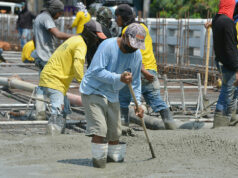I am undecided on the call for “federalism.” The matter requires deeper study. We must carefully review the successes and failures of countries where a federal or central government successfully works with autonomous or self-governing and self-sustaining states.
Frankly, I am still unconvinced this particular change should happen within this administration. Perhaps in the next, building on what may be started within this term.
My reservation at this point results from what I perceived to be the shortcomings of previous efforts to create autonomous regions, particularly in the Cordilleras and in Muslim Mindanao. And despite past initiatives to decentralize and devolve public services, their delivery in terms of quality and quantity still leave much to be desired. Simply put, why even decentralize — or federalize — if it will not significantly improve people’s lives?
I am open to the idea, of course, encouraged by the successes of countries like the United States and Canada and Germany. But, being from Metro Manila myself, I believe my openness to support the call for federalism relies less on my disdain for “Imperial Manila,” and more on the hope that it can lead to decentralization and the establishment of more economic centers. This, in turn, can result in sustainable and widespread economic growth and satisfaction.
Last weekend, I received an e-mail from former Finance secretary Gary Teves, who shared his thoughts on the economic implications of federalism. I believe Gary is the right man to do just that, having been Finance secretary for six years, Landbank president for about five, a three-term congressman, and a constitutional convention delegate prior to martial law.
And this was what he had to say about the matter:
“Federalism is not a cure-all, but it can give the Philippines a better chance at achieving a more equitable distribution of economic growth and opportunities… It can help address imbalances in regional growth by increasing LGUs’ share of the national budget. We can realistically hope to gain widespread, faster, and more sustainable economic development and progress to address persistent poverty.”
But Gary also believes certain preconditions should first be met prior to the shift to federalism, so as to boost our chances of success. These precondition include the ff:
Clarify division of responsibilities between federal and regional governments to avoid overlaps, ensure accountability, and determine the formula on revenue-sharing;
Intensify the capacity-building of LGUs and the training of local leaders to better fulfill their bigger and more challenging roles;
Institutionalize governance reforms such that the bureaucracy’s efficiency would remain even with a change of leaders after every election; and
LGUs should be subject to more accountability.
I believe Gary hit the nail on the head in setting his preconditions, as they necessarily point more to making LGUs ready to handle their own affairs. It is no easy task to run your own government and produce your own budget.
This, to me, is the crucial stage of making the entire effort work. Experience in the past with respect to devolution and decentralization already showed us how lack of proper preparation can result in failures.
As Gary noted, at present, given the 40-60 IRA (Internal Revenue Allotment) sharing, many LGUs still could not meet the budgetary requirements to perform devolved functions like agriculture and health.
And, aside from most LGUs not being able to generate sufficient revenues on their own, the national government has also been unable to give the full 40% share of LGUs that could have funded more locally determined programs and projects.
“At the outset, the national government should first give LGUs the full 40% of their IRA. Congress should also revisit the IRA formula and take into account, not just land area and population, but also poverty incidence to make the allocation of funds more equitable. Over time, the allocation should be gradually increased in favor of poorer regions as they continuously improve their fiscal capacity,” Gary said.
“As more powers and functions are delegated to the states or regions, there should be a corresponding increase in their resources to be able to perform these functions well. Over time and gradually, as the Philippine federal system takes shape, the revenue-sharing may be closer to the 80-20 envisioned by [Nene] Pimentel, or 70-30 as in the case of Canada,” he added.
Gary also said any revenue-sharing formula “should also take into consideration paying off our national debt. Just as children should not be burdened with paying the debt of their parents, the proposed federal government must have sufficient resources to pay off the country’s debts. The federal government, as the head of the family, needs to enlarge its resources to ensure that it will be able to sufficiently provide for the needs of the poorer regions, and still be able to continue paying its liabilities.”
The aim, as Gary puts it, is to provide for a “more equitable distribution of resources” that can “then spur simultaneous economic development across the country.”
He added that having more resources would allow particularly poorer regions to provide for better social services but at the same time give more attention to economic activity and investment promotion, and to leverage on comparative advantages to develop local industries.
Gary’s biggest caveat, however, is that “the success of federalism will be very much dependent on factors other than the structural change itself.” And, I cannot agree with him more.
Like in many other attempts at change, I believe the most difficult aspect to manage is people. The success of any initiative relies heavily on people’s buy-in, support, openness to change, and willingness to get involved.
The path towards federalism is dark and slippery. It has many twists and turns, and will have to go through a myriad of political offices before it even sees the light of day. Realistically, the very seed of the idea can already die even before it gets planted. Self-preservation and self-interest are the usual culprits that turn well-meaning plans into political gambits. Where the federalism call will actually go, at this point, is still anybody’s guess.
But, hopefully, with more well-meaning people like Gary and other leaders who have been part of Philippine government history and have gained wisdom in the process, the federalism initiative can be properly guided and shepherded towards the path that will see it take root and grow, and ultimately bear the twin fruits of sustainable economic success and social progress.
Marvin A. Tort is a former managing editor of BusinessWorld, and a former chairman of the Philippines Press Council.



